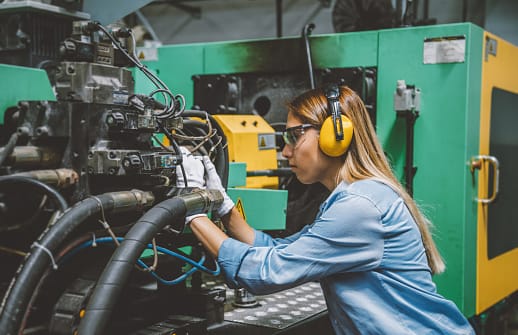Industrial companies are continuously searching for solutions to increase efficiency and reduce costs. As a result, industrial manufacturers are incorporating new technologies and equipment into their production processes to streamline operations and cut expenses. Lithium-ion batteries are a growing segment in the industrial market due to their versatility and cost-effectiveness.

These rechargeable batteries are most commonly used in cell phones, laptops, cameras, drone controllers, and other portable electronics due to their lightweight and energy density. These characteristics make lithium-ion batteries ideal for heavy-duty equipment such as forklifts, lift trucks, material handling machines, or anything that requires high power over a short period. This blog post explores the various benefits of using lithium-ion batteries in industrial applications.
Lithium-ion Batteries are Fast Charging
Since lithium-ion batteries have a comparatively high energy density and can be charged quickly, they have become an excellent choice for applications requiring rapid power. The quick charging feature allows industrial equipment to keep running at peak productivity for longer periods. To achieve the highest performance level, manufacturers must ensure that their equipment uses the most efficient battery technology with the longest life cycle possible.
Lithium-ion Batteries are Durable
Industrial manufacturers must ensure that their products last long before being discarded or thrown away. Lithium-ion batteries come in many sizes and models that offer various applications. There is one for every application with multiple types of lithium-ion batteries available on the market.
For example, a lithium-ion battery for industrial equipment with high capacity may be necessary if industrial equipment is used at work sites with numerous short bursts of energy use. On the other hand, a small-capacity lithium-ion battery may be ideal for devices such as consumer electronics or smart watches that require constant power throughout.
When choosing a specific model based on your project requirements, consider primary factors such as the current draw and discharge rate before making a final product selection to get the maximum performance out of your investment in industrial equipment.
Lithium-ion Batteries Enhance Energy Bills
Although lithium-ion batteries vary widely in performance levels and sizes, they all have one thing in common – their ability to store high energy. Lithium-ion batteries are the most environmentally friendly battery available that is often used in industrial applications because of the level of power they can supply and expect a longer life expectancy compared to other battery types.
Industrial manufacturers need to keep their costs for operating equipment down as low as possible, especially when it comes to maximizing the use of energy from industrial electric motors. Through careful consideration concerning your electric motor needs and battery selection, you can minimize your electric power consumption to less than 20% of its total capacity for up to 90% of the overall run time.
That means that you can significantly enhance the utilization rate of your motors by carrying out numerous short bursts at work sites throughout each day or when operating large machinery at work sites in harsh environments such as outdoors or in warehouses.
Less Downtime, More Productivity
The biggest benefit of choosing a lithium-ion battery for industrial applications involves storing additional power for increased utility and extending the operating time of motors. The reason why you need extra time to operate your motors is so that you can use them at their top performance and keep your production lines running smoothly.
Many electric motors are used throughout the manufacturing industry to operate machines and equipment such as conveyor belts, cranes, loaders, and forklifts. All these machines will require their use at maximum efficiency with less downtime, which is where the lithium-ion batteries come in.
Take Away
Lithium-ion battery technology has made considerable strides since being introduced into industrial projects. It has increased substantially in performance parity with lead acid batteries over the last few years due to advancements.
